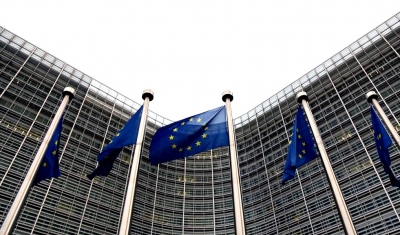Brussels, Feb 13 : Both the European Union (EU) and the eurozone should narrowly avoid a technical recession, according to the European Commission’s Winter 2023 Economic Forecast published on Monday.
The growth outlook for 2023 is raised to 0.8 percent for the EU and 0.9 percent for the eurozone, according to the document, which was presented by European Commissioner for Economy Paolo Gentiloni.This is respectively 0.5 and 0.6 percentage points higher than in the Autumn Forecast, Xinhua news agency reported.
Both areas are now set to narrowly avoid the technical recession that was anticipated for the turn of the year, according to the Commission.
The 2022 growth rate for both the EU and the eurozone is estimated at 3.5 percent, Gentiloni said.
Positive developments that have helped improve the growth outlook for 2023 since autumn include a drastic reduction in the gas price as well as a strong labor market.
The European gas benchmark price has fallen below the pre-Russia-Ukraine conflict level, thanks to a drop in demand, the mild weather and gas supply diversification, he said.
At the cut-off date of the forecast (Feb 1), futures on the TTF (Title Transfer Facility) were trading within a narrow range of 55-70 euros per megawatt-hour over the forecast horizon, according to Gentiloni, which is substantially below autumn levels but remains more than three times higher than in 2019.
The resilience of European households and businesses also played a major role, with consumption 25 percent lower than the average for 2017-2021 in October and November, thus overachieving the EU’s reduction of gas consumption target.
The labor market also remains strong, with the unemployment rate remaining at its all-time low of 6.1 per cent at the end of 2022.
Headline inflation in the EU is projected to fall from 9.2 per cent in 2022 to 6.4 per cent in 2023 to eventually reach 2.8 per cent in 2024.
Eurozone inflation should follow a similar trend, going from 8.4 per cent last year to 5.6 per cent this year and reaching 2.5 per cent next year.
However, according to the forecast, headwinds remain strong.Consumers and businesses continue to face high energy costs and core inflation was still rising in January, further eroding households’ purchasing power.
As inflationary pressures persist, monetary tightening is set to continue, weighing on business activity and exerting a drag on investment.
Inflation risks remain largely linked to developments in the markets, mirroring some of the identified risks to growth.
Especially in 2024, upside risks to inflation will prevail, as price pressures may turn out to be broader and more entrenched than expected if wage growth were to settle at above-average rates for a sustained period.
We have a better-than-expected outlook, less negative than expected situation, but this doesn’t mean that we have a positive overall outlook, Gentiloni said #economy #avoid #headwinds #persist #Telugu #TeluguStop
.






